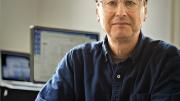Peter Suber’s life bridges multiple places, passions, and positions. He has cycled across America, scooted around Sweden on a Vespa, and voyaged to Antarctica with a boatful of polar biologists who were conducting a penguin census. Now, he juggles a family life in Maine and a professional calling in Cambridge. At Harvard, he serves simultaneously as director of the Office for Scholarly Communication (an arm of the library system) and director of Harvard’s Open Access Project (sponsored by the Berkman Center for Internet & Society). Both offices advance the cause of open access, a movement to provide scholarly work to the Internet-going public free of charge. Suber’s interest in open access ignited when, in the early days of the Internet, he began republishing his own scholarly work in philosophy on his personal website. The reaction surprised and invigorated him: his experiment of freely sharing his work online gained more readers, and more engagement, than his official publications did. “What started as a geeky excuse to play with HTML,” he says, “turned into the realization that the Web was a serious medium for scholarship.” Ever since, he has worked to fix an academic-publishing environment he believes is broken: that doesn’t reach the readership it should, or could, because it erects, maintains, and jealously polices barriers to scholarly information (see “The ‘Wild West’ of Academic Publishing”). The journey has led to his recent full-time, double-duty appointment. In his office, a particularly important photograph hangs on the wall. One of his daughters took it for a photography-class assignment about “Objects of Desire.” It depicts books. Some are closed, and some, much to Suber’s delight, lie open.
Open Access proponent Peter Suber, briefly profiled
Open Access proponent Peter Suber, briefly profiled
The open-access proponent works to increase the flow of scholarly information.

You might also like
Eating for the Holidays, the Planet, and Your Heart
“Sustainable eating,” and healthy recipes you can prepare for the holidays.
Five Questions with Michèle Duguay
A Harvard scholar of music theory on how streaming services have changed the experience of music
Harvard Faculty Discuss Tenure Denials
New data show a shift in when, in the process, rejections occur
Most popular
Explore More From Current Issue

The Enterprise Research Campus in Allston Nears Completion
A hotel, restaurants, and other retail establishments are open or on the way.







